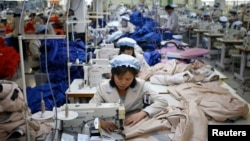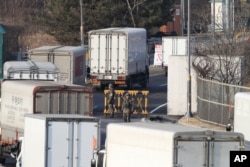South Korea said on Sunday that 70 percent of the U.S. dollars paid as wages and other fees for the now-suspended Kaesong industrial project run jointly with the North had been diverted for use in Pyongyang's weapons program and luxury goods for its leader.
It is the first formal acknowledgement by the South that the 54,000 North Korean workers at the Kaesong complex saw little of the $160 they were paid on average a month. South Korea on Wednesday suspended the project as punishment for the North's long-range rocket launch Feb. 7, saying it would no longer allow the funds paid to Kaesong to be used in the North's missile and nuclear programs.
The North conducted its fourth nuclear test last month.
The North called the South's move to suspend operations "a declaration of war," kicking out all South Korean workers Thursday and freezing the assets of the South Korean firms.
"The wages for the North's workers and other fees were paid in cash in U.S. dollars to the North's authorities and not to the workers," South Korea's Unification Ministry said. "This is believed to be channelled in the same way as other foreign currency it earned."
The cash is then kept and managed by the ruling Workers' Party's Office 39 and other agencies, the ministry said. The ministry said it had confirmed the movement of the money through various sources, but did not specify them.
Office 39 is widely believed to exist to finance the luxurious lifestyle of the North's leader. The office is also believed to be part of the North's agencies that fund the country's missile and nuclear program.
Kaesong's North Korean workers were given a taste of life in the South, working for the 124 mostly small- and medium-sized manufacturers that operated there, about 54 km (34 miles) northwest of Seoul.
The minimum wage for North Korean workers was about $70 a month, although the companies paid more than double that amount after overtime and bonuses, although that payment is low compared to the cost of labor in the South.
The Kaesong project was born out of the first summit meeting of the rival Koreas in 2000, where their leaders pledged reconciliation and cooperation. It was the last remaining symbol of that effort in the volatile North-South ties over the years.
Kaesong had been shut only once before, for five months in 2013, amid heightened tensions following North Korea's third nuclear test, although its continuing existence often seemed tenuous.






